I don't think I need to write long narratives about the food in Germany, just an explanation of the pictures... right?
For my 3-day stay in Frankfurt, I opted to shop for typical components of a traditional German 'abendbrot' ('evening bread', AKA dinner): bread, meat, cheese, a buttery spread, some fruit and a sweet for dessert. It was the first time I had ever eaten lemon flavored chocolate. If possible, it won't be the last time: it was delicious!
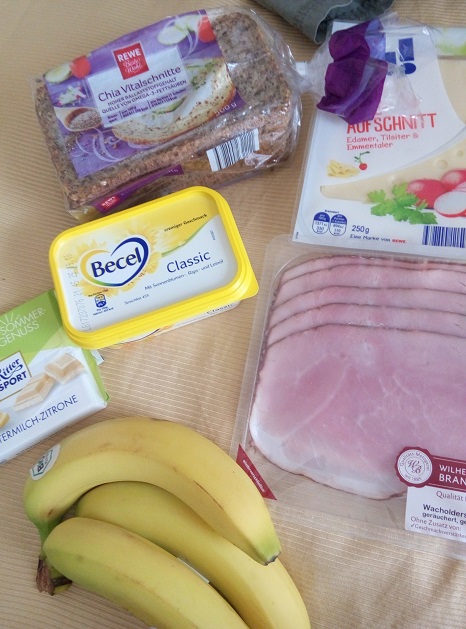
It is quite common to snack while out. A favorite throughout the country is a Doner Kebap: roasted meat with lettuce and tomato on a bun. The best one I have ever eaten, including during my stay as a youth, was in Frankfurt. Unfortunately I did not think to take a picture of it; I wised up to picture taking later in my trip. Here is a variation of the traditional sandwich, a Doner bowl: French fries on the bottom; roasted, shaved meat on top and all of it drowning in a savory sauce.
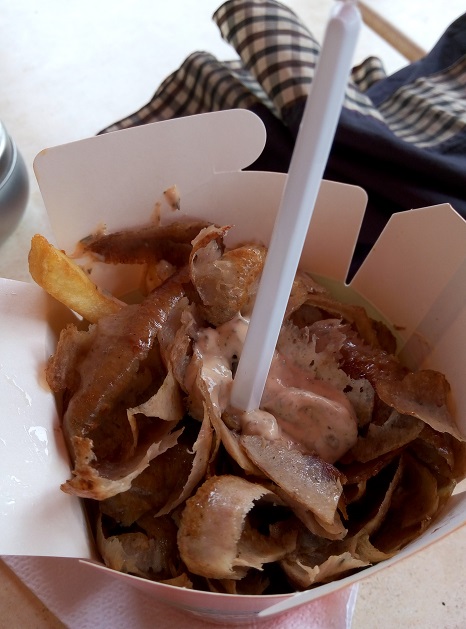
Another popular snack is sausage and bread with mustard. This is not a tear-inducing mustard like wasabi but a gentle, spicy sauce that brings out the flavor of the grilled meat.

German cuisine is mostly either boiled or grilled, thus easier on the stomach than fried. Perhaps that is why my stomach found this food much more agreeable.
The perrenial favorite of fast food: the currywurst (a sausage covered in curry catsup) with fries. (that might contradict my previous statement of German food being boiled or grilled. However, one doesn't eat 'curry mit pommes' every meal, or even every day, so my previous statement is true).

Germans prefer dipping their fries in mayonnaise rather than catsup, thus you have the option of both on your plate when you order this original Berlin favorite.
Wheat and sweets form a large part of the German diet. In their most delectable form, they present as pastries. A common pastime is to have coffee and cake, a habit I partook of with gusto!


Glazed fruit tarts with cream filling

Honey-almond cake and a coconut macaroon
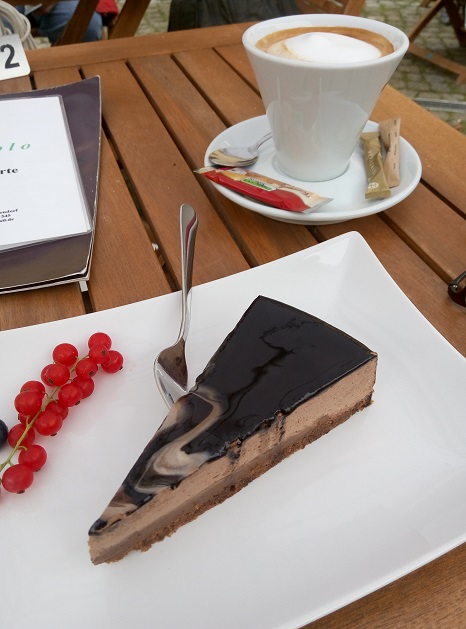
Chocolate mousse cake
NOTE: I only ate so many coffee/cakes in order to present them to you (giggle!)
In fact, I did my best to have coffee and cake every afternoon but, sadly, I failed in this mission. Here, you are witness to my few successes.
An overwhelming favorite is Italian ice cream, what is also known as gelato. This treat is catching on in China. You should try some!

Before
leaving China, I had set goals for myself. Eating goals, that is.
Foods that I'd not eaten in so very long, like a wienerschnitzel.
Oddly enough, ethnic restaurants abound: Greek, Italian, Turkish and
Mediterranean, but it was surprisingly difficult to find an authentic
German restaurant. The first one I stumbled across, during my
day-long bike ride around Berlin, offered up this traditional dish:
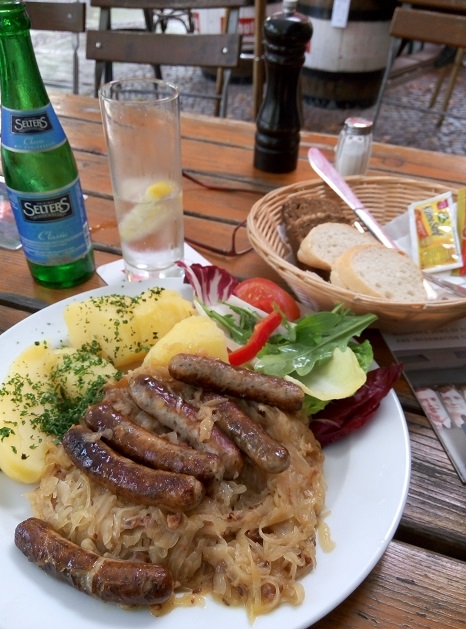
Grilled sausage on a bed of sauerkraut, with boiled potatoes and salad. Bread is a common complement to any German meal, and selzer water is ubiquitous.
NOTE: Germans are not famous for eating huge chunks of meat. Their intake generally consists of sausages of various types. However, there are exceptions...
I've been in Germany for 2 weeks and have yet to have a wienerschnitzel: a piece of veal or pork pounded flat and breaded, and then grilled (or fried) and served with potatoes and red cabbage. I had to do an internet search to find this dish, visiting an out-of-the-way kneipe (a neighborhood bar and restaurant) for the pleasure.
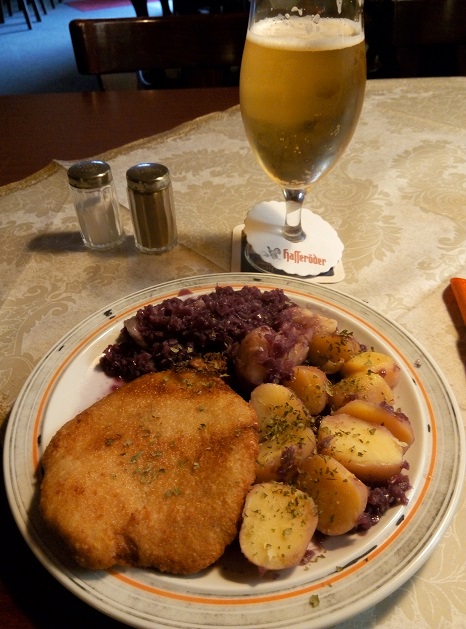
Actually, a wienerschnitzel comes with mushroom gravy. This picture is of a plain schnitzel. It was good, but I should have gone with the proprietor's suggestion: fleischroulade (a meat roll: rice and cabbage wrapped up in a thin beef strip, and covered in sauce).
Although I had ordered a seltzer water with my lunch, out of either habit or tradition, the waitress brought me a beer. I was a bit uncomfortable downing a beer just hours before flying back to China but, as it turns out, she was right: it went perfectly with the meal. My last meal on German soil.
Guten Appetit! (Eat well!)
So no Germans have cholesterol problems ? And if you're a Chinese person in Germany, should you expect to "adapt" to the local cuisine and gorge yourself on a German diet ? ( and vice versa ) When in Rome..... ?
Think of the koala: if any other animal consumed eucalyptus as the koala does, they would surely die, for eucalyptus is not only nutritionally poor, but toxic as well. However, the koala survives and thrives.
Thus debating the merits of a European versus Chinese diet is like comparing apples to oranges.
While it is true that a wheat/grain-based diet has been proven unhealthy, the largest questionable element in Chinese cuisine is surely that so much is fried. To wit, the proportion of the population who suffer strokes (5, in my little neighborhood!). High cholesterol is a factor in strokes. Could all of that cholesterol come from eating fried, oily food?
True, the Chinese have been around a long time and a lot of that is attributed to their diet, but then, Germans have been around for a long time, too. The Germans are adapted to their diets and the Chinese are adapted to theirs. Just like koalas, whose environment is full of eucalyptus.
No effort needed in killing the messenger when all who partake in this type of diet are happpily killing themselves. I suppose that the crutches you used earlier would have prevented any keel hauling. Are more than a billion Chinese so wrong with the far less fat and sugar laden foodstuffs that they are consuming ?
To each their own! No sense in killing the messenger... especially if said messenger partook enough of this type of food. According to you, I should soon keel over
Mountains of fats and sugar. All washed down with vats of beer. A recipe for bloating and heart attacks. And no mention of sour Krauts.

In all seriousness, though...
This cuisine is the food of my childhood, having grown up there. Some of the eating habits I have unconsciously tried to mimic all of my life, no matter where I was: coffee and cake, for example.
As far as cooking culture goes, China gets higher marks than Germany, simply because of the sheer variety of dishes. But, in my opinion, German food gets higher marks for taste - again, because it is what I grew up on.
Going there has inspired me to replicate German recipes as much as possible though. I've had some successes!
obviously you have been indulging yourself with plenty of mouthwastering german food, as if you would be restricted to some monastery diet upon your return to china.








Comment